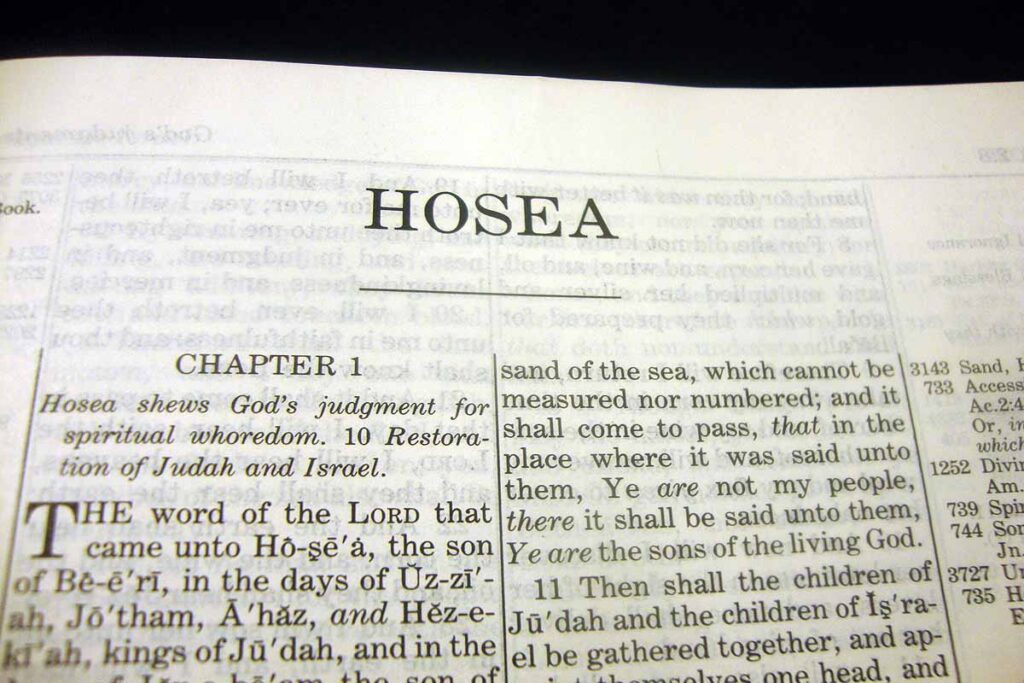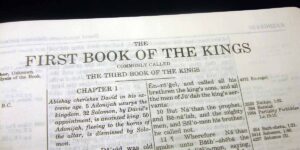The book of Hosea is a love story – real, tragic, and true. Transcending the tale of a young man and his wife, it tells of God’s love for his people and the response of his “bride.” A covenant had been made and God had been faithful. His love was steadfast and his commitment unbroken. But Israel, like Gomer, was adulterous and unfaithful, spurning God’s love and turning instead to false gods. Then after warning of judgment, God reaffirmed his love and offered reconciliation. His love and mercy were overflowing, but justice would be served.
Hosea was commanded by God to marry a woman who was unfaithful in marriage and would cause him many heartaches. Just as Gomer lost interest in Hosea and ran after other men, we too can lose appreciation for our special relationship with God and pursue dreams and goals that do not include him. When we compromise our Christian lifestyles and adopt the ways of the world, we are being unfaithful.
God wanted the people in the northern kingdom to turn from their sin and return to worshiping him alone, but they persisted in their wickedness. Throughout the book, Israel is described as ignorant of God, with no desire to please him. Israel did not understand Hosea. Like a loving husband or patient father, God wants people to know him and to turn to him daily.
The book of Hosea dramatically portrays God’s constant and persistent love. As you read Hosea, watch the prophet submit himself willingly to his Lord’s direction; grieve with him over the unfaithfulness of his wife and his people; and hear the clear warning of judgment. Then reaffirm your commitment to being God’s person, faithful in your love, and true to your vows.
Writer of Hosea
The opening verse. “The word of the Lord that came to Hosea, the son of Beeri,” identifies Hosea with other Old Testament prophets and follows the same general pattern of naming the book after its author. Beeri is a Hittite name in Genesis 26:34, perhaps demonstrating the practice, as today, of naming children from the Scriptures.
Date Written
The Old Testament prophets commonly dated their ministries in conjunction with reigning kings. In Hosea’s day, the Judean kings were Uzziah, Jotham, Ahaz, and Hezekiah. The king of Israel was Jeroboam, the son of Joash. Jeroboam’s last year 753 B.C., and Hezekiah’s was 687, so Hosea’s ministry was situated in this time period.
To Whom Written
Hosea depicts Israel’s unfaithfulness with a number of images from family and nature. Israel is like: a promiscuous wife, an indifferent mother, an illegitimate child, an ungrateful son, a stubborn heifer, a silly dove, a luxuriant vine, and grapes in the wilderness. Yet Israel’s unfaithfulness and obstinacy are not enough to exhaust God’s redeeming love that outstrips the human capacity to comprehend.
Historical Setting of Hosea
Hosea prophesied during the twilight years of the northern kingdom of Israel, a time of rapid moral decline. Worship of false gods was mixed with the worship of the one true God. Weakened by internal strife, Israel collapsed in 722 B. C. when the nation of Assyria destroyed Samaria, Israel’s capital city.
Theological Contribution
Many people believe the Old Testament portrays God’s wrath, while the New Testament pictures His love. But the book of Hosea includes tender expressions of steadfast love among the Prophet’s descriptions of judgment. Hosea ranks with Deuteronomy and the Gospel of John as major biblical treatises on the love of God.
Special Consideration of Hosea
Few events in the Bible have been debated as strongly as Hosea’s marriage. The command for a man of God to marry a harlot is so startling that interpreters have offered many different explanations, but the plain meaning of the text is that Hosea, married a prostitute at God’s direct command. In this way, through his own tormented life, Hosea could present a striking picture of the pain in God’s hearts because of the harlotries of HIs covenant people.
Click here to download or print the Bible outline “Hosea – Powerful Love Overcomes Rebellion“.





